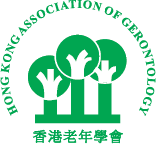香港老年學會於1986年開始由一群熱心於安老服務工作的人士發起,學會的成員來自不同的界別,包括醫療、護理、社會工作、物理治療、職業治療、心理學家及學者等。本會並於1989年成為國際老年學會之會員。本會成立的主要目標是促進香港老年學的發展和提升香港安老服務之水平。
願景
香港成為亞洲最關顧長者的社會
使命
促進社區人士關注香港的長者醫療、衛生、社會福利、長期照顧等服務、及提升本港老年學研究和教育的水準。
目標
- 聯絡各地老年學機構與組織,促進彼此了解與合作;
- 促進各界關注安老服務;
- 促進香港安老服務的發展,籍此提高長者的生活質素;
- 推動老年學的研究;
- 促進老年學培訓水平,以提高安老服務之水平。
安老服務政策
本會積極參與安老政策之討論及推動,並與從事安老服務之同工、勞工及福利局、社會福利署及安老事務委員會作緊密合作,以促進香港安老服務的發展。
學術及科研活動
由1992年開始,本會定期舉辦香港老年學週年會議,為本港及世界各地之政府官員、醫生、學者及從事安老服務之同工提供一個交流及經驗分享之平台。此外,本會亦曾舉辦多項世界性的老年學會議,例如: 於1995年舉辦第五屆亞洲及大洋洲地區老年學會議和於2002年舉辦第一屆全球華人長期照顧會議。
刊物
本會自1987年開始出版<香港老年學報>,其後於2006年與香港老人科醫學會合作出版 <亞洲老年學及醫學雜誌>,每年出版兩期,主要包括不同類型安老服務及老人科醫學文章。 此外,本會亦出版不同類型的刊物,包括《安老院舍醫護專業服務手冊》及《長者及殘障人士個案管理手冊》等。
香港老年學學院
香港老年學會有見於本港人口老化的加劇及社會上對護老知識需求的殷切,於2000年11月正式成立了香港老年學學院。由成立至今,學院曾為會員及從事安老服務之同工舉辦超過1,000項課程及工作坊,合共為超過25,000位學員提供專業之安老服務培訓。另外,本會亦定期舉辦有關安老服務之演講和研討會。同時,本學院為社會福利署、勞工及福利局、技能提升計劃「安老照顧業」、僱員再培訓局等之認可培訓機構。
香港安老院舍評審計劃
「香港安老院舍評審計劃」是香港老年學會為全港安老院舍而設立的自願性參與評審計劃,目的是協助院舍提升服務質素。評審標準的主要範疇包括「管治」、「環境」、「服務流程/照顧流程」及「資料管理/溝通」, 共40項標準及224項細則,而評審標準於2008年5月獲「國際健康照護品質協會」 (International Society for Quality in Health Care)順利通過評審標準的認證,是目前本港唯一受國際組織認可的安老院舍評審計劃。
組織架構圖





